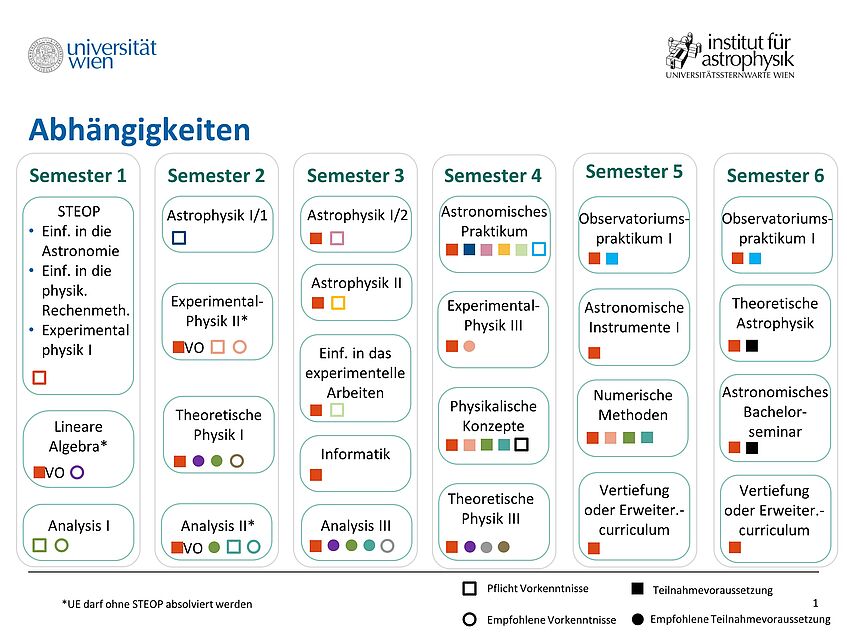The course of study
The curriculum for the bachelor's degree in astronomy is the most important basis for an efficient and pleasant course of study! All courses are described in it and the semesters in which they are recommended. The dependencies, which courses have to be completed before a course, are also specified there. It is highly recommended that you read through and work through the curriculum yourself!
Create your timetable, using times and dates of u:find, at the beginning of each semester. The compulsory courses, in particular, provide a certain structure. Once you have entered all the lectures and seminars, you will get an overview of which practice groups are suitable for you.
After the first semester, many processes repeat themselves. However, a few things are particularly important when examining the curriculum in more detail.
- There are various direct and indirect dependencies of courses that have to be taken into account.
- No further courses in the chain can be attended without the direct requirements (these are specifically stated in the curriculum and the newsletters of the University of Vienna).
- Indirect requirements should be met, but are not regulated by law, but the speakers expect that they have been met. (These requirements are mostly preliminary courses, e.g.: Analysis for physicists 1 → Analysis for physicists 2)
- This results in the graphic attached below for dependencies in the Bachelor's degree.
- In addition, there are space restrictions for various courses in the later semesters (especially internships), which must also be taken into account.
- If there are too many students, the field of study and requirements are filtered to bring the number allowed to the possible number. (In case of doubt, the student representatives can help further).
- PM-AnaPh3 Analysis for Physicists III, PM-Ph3 Experimental Physics III: Quantum Mechanics, Atomic and Nuclear Physics (8ECTS) and PM-TP2 Theoretical Physics III: Quantum Mechanics (9 ECTS): Students in the Bachelor 2019 complete the module exam. Completion of the respective PUE is strongly recommended, but not mandatory. Students in the 2015 bachelor's program take the VO exam and the mandatory PUE (see equivalency list) instead of the module exams.
- Towards the end of the course, the (first) major academic work, the Bachelor's thesis, is written. A topic for the bachelor thesis can already be started in the fifth semester to have enough time to finish it by the end of the sixth semester. Talk to potential supervisors early on and clarify the content and scope as precisely as possible. The workload for a Bachelor's thesis is specified in the curriculum, with 1 ECTS corresponding to 25 hours of work. Be sure to contact your supervisor if you have any questions or changes.
Below is a visualization (in german) of the requirements for the astronomy bachelor's degree. It should be noted that the STEOP is a basic requirement for all courses from the third semester onwards, even if it is not explicitly stated in this figure. Elements that match in colour belong together, filled elements require empty elements. Notice the different connection arrows.

